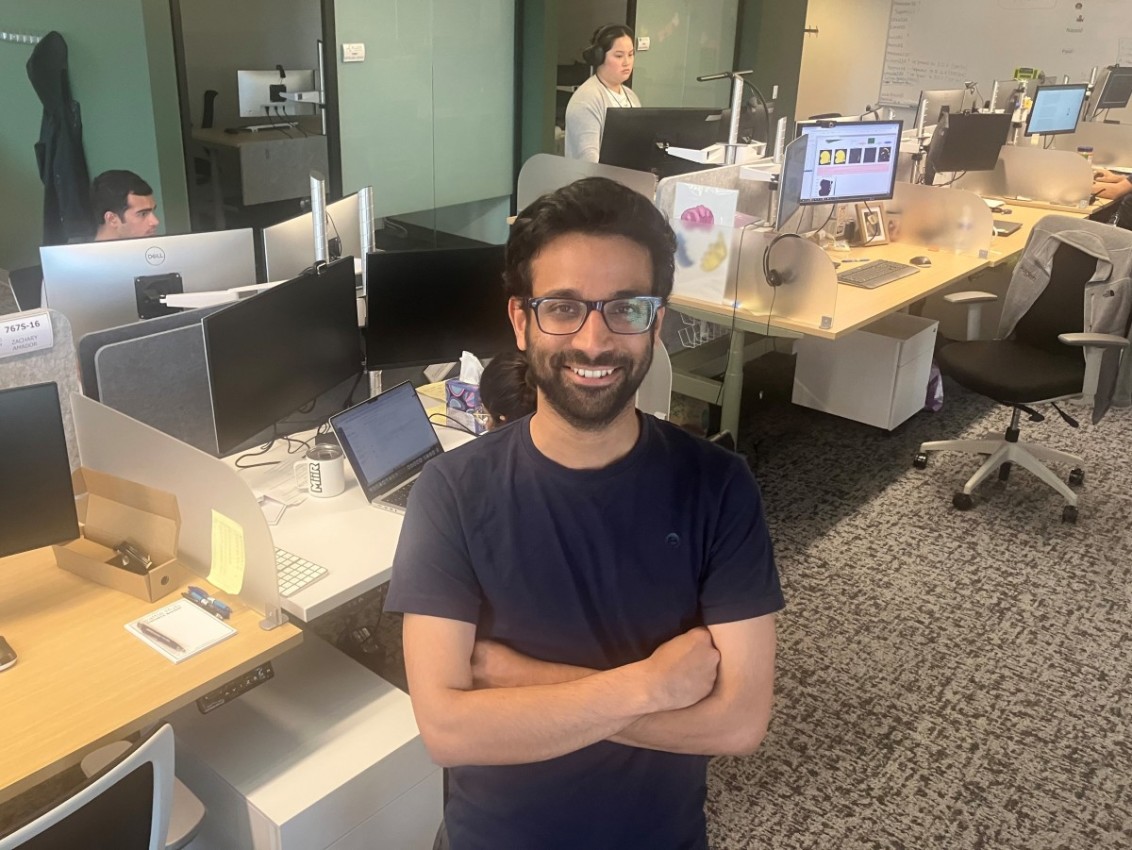 Sudarshan Pinglay: 'He is a blizzard of wonderfully creative ideas coupled with the resolve and know-how to triage and implement the best of these,' says Dr. Jay Shendure.
Sudarshan Pinglay: 'He is a blizzard of wonderfully creative ideas coupled with the resolve and know-how to triage and implement the best of these,' says Dr. Jay Shendure.
For a 30-year-old, Sudarshan Pinglay has an impressive CV:
-
Ph.D. in Cell and Molecular Biology from New York University, where he was given the university-wide Outstanding Dissertation Award.
-
More than a $1 million over five years in research funded by the National Institutes of Health.
-
A faculty position at the Seattle Hub for Synthetic Biology, a collaboration among the UW, the Chan-Zuckerberg Initiative, and the Allen Institute, and headed up by BBI’s Scientific Director Jay Shendure.
But what may be the most intriguing aspect of Pinglay’s young career is not on the four-page curriculum vitae – his connection to Francis Crick and James Watson. As a child in Bangalore, India, he lived in an apartment complex with T. Krishnan, a pioneer in radio astronomy, one of the nation’s leading astrophysicists, and a colleague of the two renown scientists who, with Rosalind Franklin, are credited with discovering of the double helix structure of the DNA molecule.
“Dr. Krishnan would regale me with stories about Watson and Crick,” said Pinglay. “He shared an attic with them in the Cavendish Lab at the University of Cambridge. He knew them well when they trying to figure out the structure of DNA. He was a Renaissance man, well-rounded and curious about philosophy, culture, art, sports, and science. All the things I enjoy. We had a great friendship.” That friendship – and their inspiring conversations – were vital to an aspiring scientist and self-described rebel. How rebellious? Pinglay flunked the 11th grade.
I just didn’t apply myself,” he said. “It was an act of defiance.” Defiance gave way to curiosity and probably a bit of humility when he flew halfway around the world, leaving all that was familiar in Bangalore to the campus of Johns Hopkins University in Baltimore. He admits to being “oblivious” about navigating the throes of college, especially “symbols of prestige,” such as honor societies and competitive internships.
Regardless, he immersed himself in his two favorite subjects: biology and philosophy. The former was obvious.
But philosophy?
“I’m fascinated with the theory of knowledge, that is, ‘How do we know that certain things are true, versus those that are not true?’” he said. “I am also fascinated by the philosophy of religion, and the history of ideas.”
Pinglay completed undergraduate studies in 2015 with two Bachelor’s Degrees in Molecular and Cellular Biology and Philosophy. Reflecting on his four years at Johns Hopkins, he noted the “moment that changed my life.”
“I took a course from the person who would become my Ph.D. mentor,” he said. “Jef Boeke’s class entitled ‘Build a Genome.’”
Boeke’s students made “completely synthetic” genomes. Each was given a small piece of DNA and “we each stitched it into a larger piece of DNA.”
“My roommate said, ‘This course is an easy A, just show up to the lab,’” Pinglay said. “That class turned on a switch for me. Jef Boeke had created a DNA sweatshop, but it was the most benevolent you could imagine. You got to do cutting-edge research and all of us undergrads got to be authors on major papers.”
At the end of the course, Pinglay inquired about joining Boeke’s lab. The professor’s response was both simple and complicated: “Sure, but we’re all moving to New York University.”
Pinglay subsequently applied to “a bunch of places” for graduate school. But he knew his continued collaborations with Boeke were assured when he was accepted to NYU – and turned down by all the other universities. Over the next seven years, he published 10 peer-reviewed papers, including seven with Boeke. Professionally, Pinglay was thriving; he expected to be a lifelong New Yorker.
But there was one scientist who had piqued his interest several years earlier during his second year at Johns Hopkins: Jay Shendure.
“It was my first seminar as an undergrad and Jay spoke about exome sequencing,” Pinglay said. “I did not understand a word, but I remembered his name, and kept up with Jay’s work.”
Fast forward to 2021 and, thanks Shendure’s friendship with Boeke, he agreed to serve as a judge for Pinglay’s dissertation. Pinglay subsequently thanked Shendure and in a follow up conversation the two discovered “a great chemistry together.” Pinglay broached the idea of working together by asking, “May I come and hang out in your lab for six months?”
Shendure agreed and now, three years later, deems it a wise decision.
“He is a blizzard of wonderfully creative ideas coupled with the resolve and know-how to triage and implement the best of these,” said Shendure. “He's also an incredibly fun and positive person to be around and talk science with.”
Pinglay arrived in Seattle in January of 2023, fully intending to return to New York – and his rent-controlled apartment in Brooklyn. But that role as “Visiting Scientist” at the UW evolved into “Independent Research Fellow” with BBI and the Department of Genome Sciences.
In January of this year, Pinglay accepted a faculty position with the Seattle Hub for Synthetic Biology.
“There are so many opportunities here in Seattle, opportunities in areas I had not even considered,” Pinglay said. “Leaving New York when I did, it was a good time to take a risk. Staying would have been the comfortable choice.”


